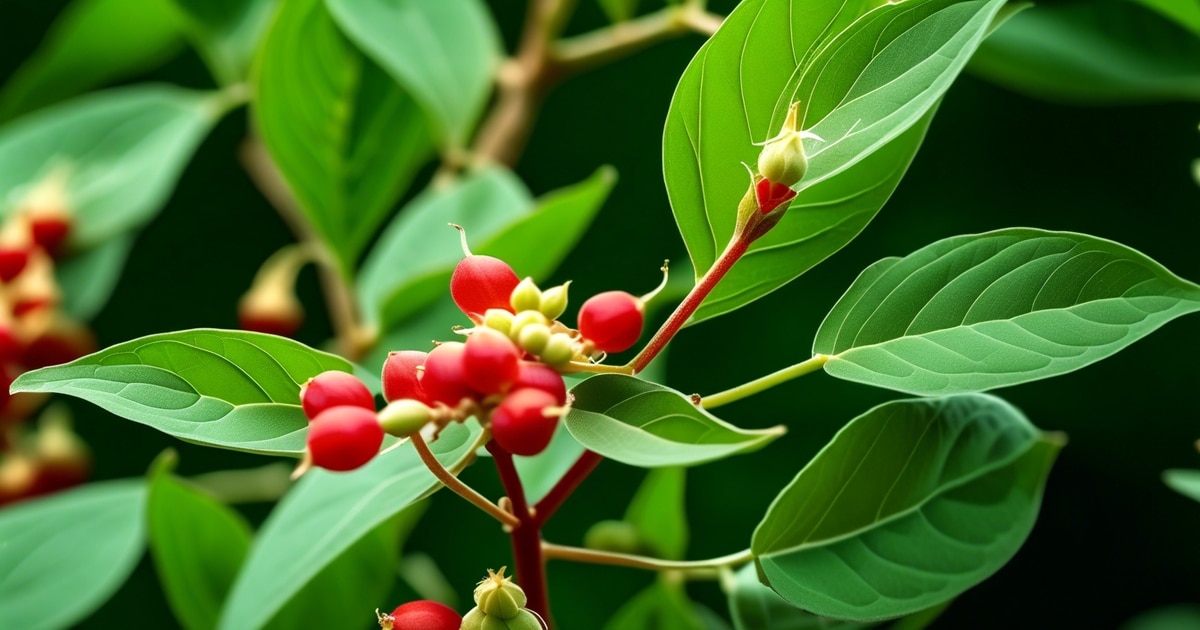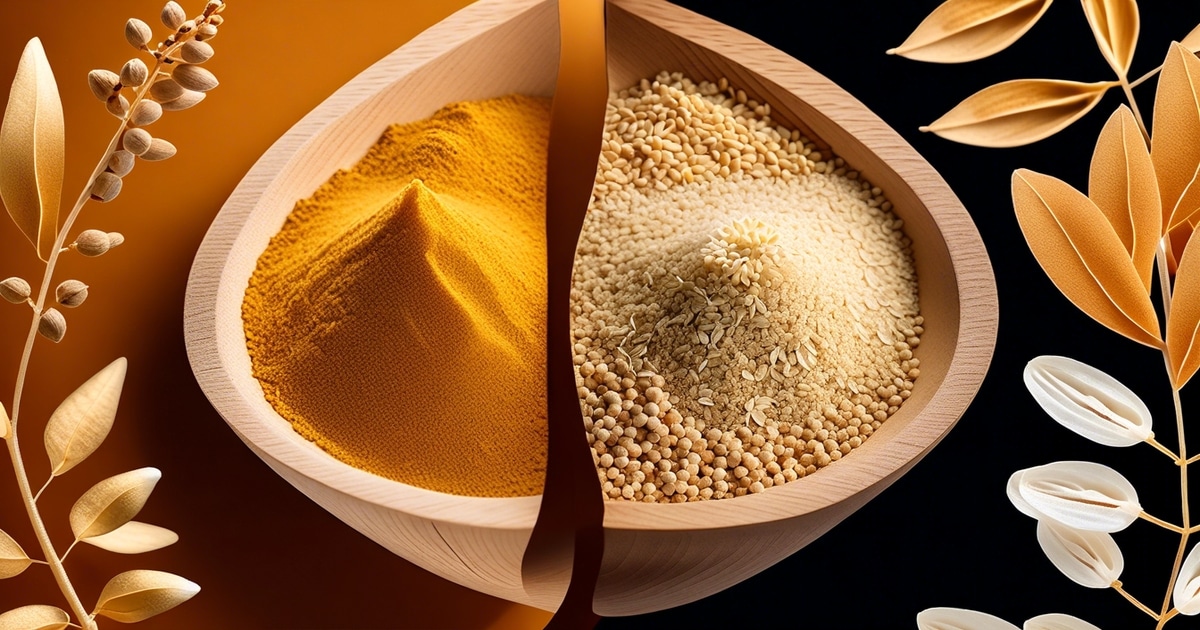Key Takeaways
-
Consider Both Astragalus and Ashwagandha: Incorporate both adaptogens, Astragalus and Ashwagandha, into your routine for a comprehensive approach to immune support.
-
Monitor for Allergic Reactions: Be vigilant for allergic reactions or itching when introducing adaptogens such as astragalus or ashwagandha into your regimen, especially if you have known allergies to plants in the same family.
-
Consult a Healthcare Provider: Before starting astragalus or ashwagandha supplements, consult a healthcare provider to ensure they are safe and suitable adaptogens for your health needs.
-
Start with Low Dosages: Begin with low dosages of astragalus and ashwagandha to assess tolerance and gradually increase as needed, under professional guidance.
-
Be Aware of Potential Interactions: Stay informed about possible interactions between adaptogens and any medications you are taking to avoid adverse effects.
-
Adapt to Pregnancy Guidelines: If pregnant or nursing, adhere to specific guidelines regarding using astragalus and ashwagandha to safeguard maternal and fetal health.
Let’s dive into the world of astragalus and ashwagandha, two powerful herbs with a rich historical background. Traditional medicine has cherished These botanical gems for centuries for their remarkable health benefits. From boosting immunity to reducing stress, astragalus and ashwagandha offer a natural way to support your well-being. Explore how these ancient remedies can enhance vitality and help you thrive in today’s fast-paced world.
Understanding the Ingredients of Astragalus and Ashwagandha
Key Components of Astragalus
Astragalus is rich in polysaccharides, flavonoids, and saponins. These compounds contribute to its potential health benefits, such as boosting the immune system and reducing inflammation. The polysaccharides found in astragalus are known for their immune-stimulating properties, aiding in fighting off infections.
Astragalus also contains flavonoids, which act as antioxidants that help protect cells from damage caused by free radicals. Saponins present in astragalus have been linked to anti-inflammatory effects, promoting overall well-being. Together, these components make astragalus a powerful herb with various medicinal properties.
-
Polysaccharides boost the immune system.
-
Flavonoids act as antioxidants.
-
Saponins possess anti-inflammatory effects.
Constituents of Ashwagandha
Ashwagandha features alkaloids, steroidal lactones, and withanolides, among its key constituents. Alkaloids in ashwagandha are bioactive compounds that may reduce stress and manage anxiety. Steroidal lactones play a crucial role in regulating hormonal balance within the body.
Withanolides are unique compounds in ashwagandha known for their adaptogenic properties, helping the body adapt to stressors more effectively. Combining these constituents makes ashwagandha a traditionally popular herb for managing stress-related conditions.
Comparing the Immune-Boosting Effects
White Blood Cell Count
Astragalus is known to boost immune function by increasing white blood cell count. This helps the body fight off infections more effectively. Studies have shown that Astragalus can enhance the production of white blood cells, which are crucial for a strong immune system.
-
Astragalus increases white blood cell count.
-
It helps the body fight infections better
Immune Responses Modulation
On the other hand, Ashwagandha supports a healthy immune system by modulating immune responses. Ashwagandha ensures a balanced and effective defense mechanism against illnesses by regulating how the immune system reacts to threats. Research has indicated that ashwagandha is an adaptogen, helping the body adapt to stressors and supporting overall immunity.
Analyzing the Anti-Inflammatory Effects
Inhibiting Pro-Inflammatory Cytokines
Astragalus, known for its anti-inflammatory properties, works by blocking pro-inflammatory cytokines. This action helps reduce inflammation in the body. By inhibiting these cytokines, astragalus can effectively combat various inflammatory conditions.
-
Reduces inflammation in the body
Alleviating Symptoms of Chronic Inflammation
Ashwagandha is another potent herb shown to decrease inflammation markers within the body. By reducing these markers, ashwagandha aids in alleviating symptoms associated with chronic inflammation, such as pain and swelling.
-
Ashwagandha reduces inflammation markers.
-
Helps alleviate symptoms of chronic inflammation
Health Benefits Comparison

Adaptogenic Properties
Astragalus promotes overall well-being and vitality due to its adaptogenic properties. This means it helps the body adapt to stressors, supporting a balanced response in times of need. For example, when facing a hectic day at work or under the weather, astragalus can boost energy and support.
-
Astragalus promotes overall well-being.
-
Supports a balanced response to stressors
-
Provides an extra boost of energy during hectic days
Stress Reduction Effects
On the other hand, ashwagandha is renowned for its potential benefits in reducing stress and anxiety levels. By incorporating ashwagandha into your daily routine, you may experience a sense of calmness and improved mood. This can be particularly beneficial for individuals dealing with high-stress situations or struggling with anxiety regularly.
Precautions and Side Effects
Medication Interactions
Astragalus might interact with certain medications. It’s crucial to seek advice from a healthcare professional before using astragalus supplements. Some medications that astragalus could interact with include immunosuppressants like cyclophosphamide.
Taking the time to consult a healthcare provider can prevent unwanted interactions and ensure your safety when incorporating Astragalus into your routine.
Allergic Reactions
Both astragalus and ashwagandha have the potential to cause allergic reactions in some individuals. Symptoms of an allergic reaction may include nausea, skin rashes, or difficulty breathing. If you experience these symptoms after taking either supplement, discontinue use immediately.
Awareness of the possibility of allergic reactions is essential for anyone considering adding astragalus or ashwagandha to their wellness regimen. Always monitor how your body responds to new supplements for any signs of adverse effects.
Interactions with Drugs
Potential Interactions
Astragalus may affect the effectiveness of immunosuppressant drugs, impacting their ability to suppress the immune system. On the other hand, ashwagandha might interact with sedatives or medications used for thyroid disorders. Both herbs have the potential to interact with certain medications, emphasizing the need for caution.
Both astragalus and ashwagandha can influence how specific drugs work in our bodies. For instance, if someone is taking immunosuppressants along with astragalus, it could reduce the medication’s effectiveness in managing autoimmune conditions by affecting their response.
-
Pros:
-
Astragalus and ashwagandha offer various health benefits.
-
They are natural alternatives that many people find helpful.
-
Cons:
-
These herbs may interact negatively with certain medications.
-
It’s essential to consult a healthcare professional before combining them with prescribed drugs.
Recommended Dosage and Forms of Dosage

Astragalus Forms
Astragalus is commonly found in capsule or extract form. Capsules are convenient for daily intake, while extracts can be added to beverages like tea.
-
Pros:
-
Easy to incorporate into daily routine
-
Precise dosing for consistent intake
-
Cons:
-
May take time to see noticeable effects
Ashwagandha Varieties
Ashwagandha supplements come in powder, capsule, or liquid extract forms. Powders can be mixed into smoothies, capsules offer a quick option, and liquid extracts provide fast absorption.
-
Powder: Mix with food or drinks.
-
Capsule: Swallow whole with water.
-
Liquid Extract: Add drops to water or juice.
Both astragalus and ashwagandha have specific recommended dosage guidelines that should be followed diligently for optimal results.
Pregnancy Considerations for Use
Astragalus and Ashwagandha in Pregnancy
Pregnancy, a crucial time for reproductive health, requires careful consideration. Astragalus, known for its potential effects on hormone levels, should be avoided during pregnancy due to its potential risks to estrogen levels. On the other hand, ashwagandha is not recommended during pregnancy as it has been found to stimulate uterine contractions, which can be harmful.
Both astragalus and ashwagandha should only be used cautiously during pregnancy and under strict medical supervision. When using these herbs while pregnant, it’s essential to prioritize the mother and baby’s safety. Consulting a healthcare provider before incorporating them into your routine is highly advisable.
-
Pros: Medical guidance ensures safe use
-
Cons: Potential risks to hormone levels
Risks vs Benefits During Pregnancy
When considering using astragalus or ashwagandha during pregnancy, weighing the risks against the benefits becomes paramount. While these herbs may offer certain advantages in non-pregnant individuals, their effects on hormonal balance or uterine activity can have adverse consequences during pregnancy.
-
Seek professional advice before using any herbal supplements.
-
What works well outside of pregnancy might not apply within this delicate period.
-
Always prioritize caution and safety over experimenting with new supplements without proper guidance.
You’ve delved into the realms of astragalus and ashwagandha, uncovering their immune-boosting and anti-inflammatory prowess. Comparing their health benefits revealed a dynamic duo that can enhance your well-being. Please remember to tread cautiously, considering precautions, interactions with drugs, and the best dosages. Pregnancy? It’s a whole different ball wax; consult a healthcare provider.
The journey continues. Take charge of your health by exploring how astragalus and ashwagandha can fit into your wellness routine. Your body’s like a garden; nurture it with the right ingredients. Stay informed, stay curious, and let nature’s remedies guide you toward vitality.
Frequently Asked Questions
Is it safe to take Astragalus and Ashwagandha together?
Yes, it is generally safe to take Astragalus and Ashwagandha together. Both herbs are known for their immune-boosting properties and can complement each other well in supporting overall health.
What are the main differences between astragalus and ashwagandha regarding health benefits?
Astragalus is primarily used for immune support, while ashwagandha is known for its stress-relieving and adaptogenic properties. Astragalus focuses on enhancing immunity, whereas ashwagandha helps with managing stress levels.
Are there any precautions or side effects when using astragalus and ashwagandha?
While both herbs are safe for most people, some may experience mild side effects like digestive issues or allergic reactions. It’s best for you to consult a healthcare provider before starting any new supplement regimen.
Can astragalus and ashwagandha interact with certain medications?
Yes, both herbs have the potential to interact with certain medications like immunosuppressants or sedatives. Consult your healthcare provider before combining these herbs with any prescription drugs to avoid possible interactions.
What forms of dosage are recommended for taking astragalus and ashwagandha supplements?
Astragalus and ashwagandha supplements come in various forms, such as capsules, powders, teas, or tinctures. Follow the recommended dosage instructions the manufacturer provides or consult a healthcare professional for proper dosing based on individual needs.

